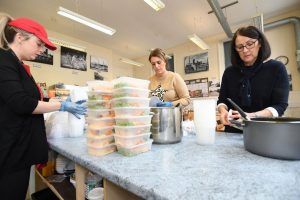As we pause for a breath in what has been the busiest time for DTAS and its members on record, it feels fitting to take some time to reflect on the past 3 months (is that really all its been?!) and our member’s experiences.
The announcement of lockdown back in March meant that life as we know it changed overnight. For a lot of us, this meant staying at home to help protect the NHS and save lives, but for community anchor organisations like DTAS member development trusts, it meant something quite different. Across Scotland, community groups and organisations went into emergency response mode, mobilising hundreds of volunteers incredibly quickly so that they could help support the most vulnerable people in their communities, ensuring that they had the essentials like food and medicine, felt supported and not cut off, and most importantly, that they knew where to go and who to phone if they needed help.
To date, 162 DTAS members have helped to distribute over £5million worth of support to communities the length and breadth of Scotland. This was thanks to the Scottish Government’s Supporting Communities Fund, a £40million introduced to help communities tackle the impact of the Coronavirus. DTAS was delighted to be able to support the Scottish Government in the delivery of this fund, getting monies out of the door to member bank accounts in as little as four days from application.
As the details of those individual community responses emerge, it is fair to say that we have been blown away by innovative and ‘fleet of foot responses’ that our members are delivering.
Take for example Thurso Community Development Trust in Caithness, who have introduced weekly YouTube broadcasts to help keep locals informed of goings on. The ‘Thurso Show’ typically lasts for half an hour and is presented by a trust board member, the Community Development Officer and often involves guests from other local organisations.
Sticking with the digital theme, Cranhill Development Trust in Glasgow has moved its weekly ‘Young at Heart’ lunch club over to Zoom, thanks to the trust’s digital ambassadors who supported the lunch club members – remotely – to get online and access Zoom, all from the comfort of their own arm chairs. The club has been critical in helping tackle feelings of isolation and loneliness.
One of the key response areas for members has been the provision and delivery of food. Organisations like Greener Kirkcaldy, Woodlands Community Development Trust and Getting Better Together in Shotts are preparing and delivering between 300 and 500 meals per week to people in their communities, helping to ensure that those who are vulnerable or shielding still have access to hot, healthy and nutritional meals. Lots of DTAS members are also very involved in the growth of their own food and Lanark Community Development Trust is making good use of peak growing season from its Castlebank Park growing compound, making up fresh produce boxes that are available to local residents, selling out an hour after being available every week!
All of this response effort has been made possible through the knowledge and understanding that community anchor organisations have of their individual communities, allowing them to deploy local knowledge and expertise to make sure that nobody is left behind. DTAS members are reporting unprecedented levels of engagement and volunteering, indicating that ‘community’ in the truest sense of the word has a seen a timely revival as people go out of their way to help neighbours, friends, acquaintances and in many situations, strangers.
Add to this mix the collaboration and partnerships that have been both formed and strengthened between organisations and it becomes easy to see why there is a real energy behind the idea of not just a community led, but a community-powered recovery.
At DTAS, we are talking to members as to how best we can support and encourage this as we move forward into the new normal. For many of our members this means stepping back and thinking about how they can continue to work on and deliver their core objectives, whilst stepping up and meeting this new, more immediate local need.
Nobody is under any illusions as to how hard the next few months are going to be as we look to re-establish income streams and cope with the surge in social need, but with this new community-powered momentum – and the wider support for it, it makes it a whole lot easier to be positive about the future.
(Update provided by DTAS)
